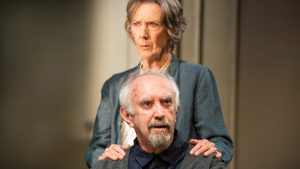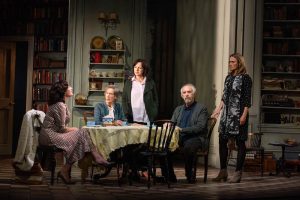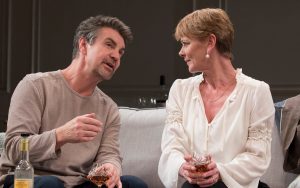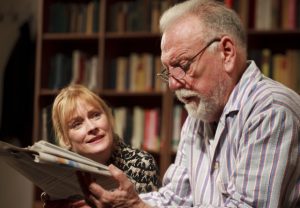Toby Stephens and Paul McGann share the honours as a man on the edge
★★★
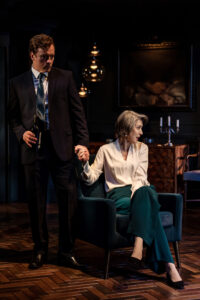
French playwright Florian Zeller’s work has become familiar to British audiences thanks to plays like The Truth, The Lie, The Height Of The Storm and the trilogy of The Mother, The Father and The Son. His new play The Forest is the first to receive its world premiere in the UK, and comes on the back of the award-winning film of The Father with Anthony Hopkins.
So you probably know Florian Zeller’s approach to playwriting. It started as an innovative way of getting inside people’s minds. In The Father, it was a brain confused by dementia, in The Mother, a mid life crisis, in The Son a depressed teenager. He achieves this by having the characters act out their lies, self deception, false memories, fears and desires, often repeating scenes with variations of dialogue or even characters, and none of it is necessarily in a linear narrative. So it’s both exhilarating and exhausting. Throughout his plays, we are asking ourselves What is the truth? What actually happened? For which there may or may not be an answer.
As time has gone on, what was surprising and original has become a signature style. It may even be in danger of becoming a cliché- but not yet! Once again, Zeller brings alive a potentially mundane story.
In The Forest, the subject is a married hospital consultant who has been having an affair with a younger woman. As she demands that he legitimises their relationship, he is overtaken by fear about what that would do to his marriage and career (the two of which are tied together, at least in his head), not to mention guilt at betraying his wife.
From the start, we are in familiar Zeller territory. We are plunged into a confusing jigsaw of scenes in which we see the adulterer’s changing memories, fantasies and fears. The title refers to a story about a prince out hunting, who in pursuit of a stag that ultimately disappears, becomes lost in a forest.
Each of the three acts (there’s no interval by the way) begins with the same or at least a similar scene. The first scene sees Pierre, referred to in the cast of characters as Man 1, and played byToby Stephens, arriving home. His wife is clearly agitated. Their daughter’s long term boyfriend has been having an affair. Pierre talks to the girl about his indiscretion. ‘Don’t worry. Everything’ll work itself out’ he says. Pierre uses a conversation with the daughter to talk about his thoughts about a man having affair. Perhaps his memory is playing tricks because on the second occasion, the daughter isn’t there and he talks directly to his wife. This time he’s talking about their child’s reaction, indicating that he is concerned about his wife’s reaction to his own affair. The third time, the daughter barely gets a mention but the room has filled with flowers.
The no-strings affair is now tied up with his marriage and career
Then there’s scene two. A middle-aged man, referred to as Man 2 and played by Paul McGann, is in bed with a young woman. We’re not in doubt for very long that this is also Pierre. I’m guessing that, in his mind, Pierre has separated his affair from the rest of his life. In other words, he becomes a different person, a kind of alter ego. Before long, we are seeing the same or a similar scene but with Toby Stephens, just as Man 2 is Pierre in the third iteration of the opening scene. This indicates I think that the once no-strings affair is now tied up with this marriage and career.
Toby Stephens is brilliant as Man 1. His ready smile becomes a nervous grin. He leans back which at first seems relaxed but eventually looks like he’s reeling from blows. Paul McGann holds his own as Man2, showing a brittle harshness that soon collapses into panic.
Pierre’s character is complex and rounded. The other characters less so, perhaps because they’re part of his memory and imagination.
The treatment of the Girlfriend in the first bedroom scene is a case in point. When she gets out of bed and you see her partly naked before she puts on a shirt. Perfectly normal in real life of course but these days, you rarely see gratuitous nudity on stage, so we must assume there is a good reason for this. Actually, in the script, she is fully naked for the whole scene. I take it that this underlines that Pierre saw her as no more than someone he has sex with. She’s only given a name later as he starts to take her threat more seriously. Excellent as Angel Coulby’s acting is, there is little personality for her to get her teeth into.
Gina McKee makes the most of her limited role
Despite the limitations of the script, the glorious Gina McKee shows fine acting skill in managing to suggest there’s a lot going on the Wife’s head. Through a combination of strangled speech and sideways glances, she conveys a lack of passion that might have been a reason why Pierre strayed, insecurity, and the possibility that she suspects something.
Anna Fleischle‘s set is in three parts: a living room, a bedroom above the living room, and an office to the side. Each setting is invisible until the lights come up on it. The first two are built with tremendous attention to detail, and this naturalistic setting helps suggest that all that is going on in Pierre’s brain is happening while he continues to live out an everyday life.
The office is the exception. It’s pretty bare and seems to be where Pierre’s conversations with his conscience take place, or possibly interrogations by the police. He is being held in the room by a white faced man in black, chillingly played by Finbar Lynch. He looks like a character from an early horror film and wheedles Pierre with questions as he alternates between a good cop and bad cop style from a police procedural. The biggest question being ‘What happened?’
So what did happen? How did the affair end? What was the fate of the Girlfriend? Well, we can never be quite certain. There are some dramatic and shocking moments which turn this play into almost a thriller as well as a who-dun-it. Director Jonathan Kent is to be congratulated for the pace, and imbuing all that goes on with an almost Hitchcockian suspense, helped by Isobel Waller-Bridge‘s edgy sound design.
By the end, we have been given some explanations (or are they?). The problem for this and other Zeller plays is that the truth, if and when it’s discovered, may not be as interesting or exciting as the process that led to the revelation.
The Forest continues at Hampstead Theatre until 12 March 2022
Paul was given a complimentary review ticket by the producer
Click here to watch this review on the One Minute Theatre Reviews YouTube channel
